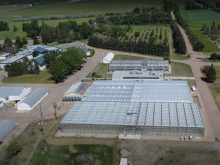OTTAWA – Proposals to tighten raw milk cheese regulations are based on solid evidence that human health is at risk, Health Canada officials insisted last week.
Joost Harwig, of Health Canada’s bureau of microbial hazards, told the Senate agriculture committee there is an under-reported health risk from raw milk cheese, despite Quebec and industry claims to the contrary.
Thousands of Canadians likely have been made sick in the past from eating raw milk or its products, he said June 6. Reliable statistics do not exist because most of the diseases are not reported, but there were three known incidents in recent years.
Read Also

Alberta crop diversification centres receive funding
$5.2 million of provincial funding pumped into crop diversity research centres
Cases not reported
“While we know of three cases, we could safely assume it was 300 or even 1,000,” he said.
One case a decade ago involved a batch of Prince Edward Island cheddar made from pasteurized milk that had been inadvertently “contaminated” by raw milk, he said.
It was sold across Canada “and we believe it caused 1,500 or more illnesses.”
The proposed regulations would require raw milk cheeses to be made from heat-treated milk and direct that other precautions be taken to reduce the bacterial content.
They were published March 30 for a 75-day period of consultation and reaction.
Almost immediately, the proposals created a controversy as Quebec raw milk cheese producers protested and had their cause taken up by Quebec sovereigntists who saw another federal plot.
The political controversy, brought into the House of Commons by the Bloc QuŽbecois, caught Health Canada and new health minister David Dingwall off guard.
Before the proposed regulations were published, there had been extensive consultations with the dairy industry and provincial governments. They had not seemed controversial.
After the controversy broke, the department created a scientific committee to review the final evidence. The consultation period ends June 13.
Last week, senior Health Canada food safety official George Paterson said the scientific advisory committee will convene July 8-9 to look at responses and weigh the evidence.
Within three or four weeks, it will make a recommendation. The proposal will be considered and sent to Dingwall with bureaucrats’ comments.
Decision this fall
Paterson said by late August or early September, Dingwall may be in a position to announce a decision.
He said they are looking for a compromise which would allow the cheeses to continue being made and imported, but which also would make the product safer. However, he did not rule out a ban on raw milk cheese.
Paterson said Dingwall has not been swamped by the political uproar.
“He has assured us that the science will not be compromised.”














